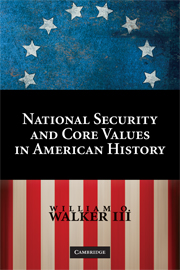Book contents
- Frontmatter
- Contents
- Preface and Acknowledgments
- Introduction: “A City upon a Hill”
- PART ONE THE ORIGINS OF THE SECURITY ETHOS, 1688–1919
- PART TWO INTERNATIONALISM AND CONTAINMENT, 1919–1973
- 3 The Postwar Era and American Values
- 4 The Construction of Global Containment
- 5 Civic Virtue in Richard Nixon's America
- PART THREE THE AGE OF STRATEGIC GLOBALISM, 1973–2001
- PART FOUR THE BUSH DOCTRINE
- Conclusion: The Security Ethos and Civic Virtue
- Select Bibliography
- Index
- References
4 - The Construction of Global Containment
Published online by Cambridge University Press: 05 June 2012
- Frontmatter
- Contents
- Preface and Acknowledgments
- Introduction: “A City upon a Hill”
- PART ONE THE ORIGINS OF THE SECURITY ETHOS, 1688–1919
- PART TWO INTERNATIONALISM AND CONTAINMENT, 1919–1973
- 3 The Postwar Era and American Values
- 4 The Construction of Global Containment
- 5 Civic Virtue in Richard Nixon's America
- PART THREE THE AGE OF STRATEGIC GLOBALISM, 1973–2001
- PART FOUR THE BUSH DOCTRINE
- Conclusion: The Security Ethos and Civic Virtue
- Select Bibliography
- Index
- References
Summary
Liberty is not the exclusive right of any racial or other group.
Walter White, 1936Give them a share. They think they are just as good as we are, and many of them are.
Franklin D. Roosevelt, 1940[H]ow hard it is for a democracy to conduct a successful foreign policy.
George F. Kennan, 1948Franklin D. Roosevelt had impeccable internationalist credentials. Secretary of State Henry L. Stimson instructed him about foreign policy matters after the 1932 election. A grateful Roosevelt opined that “we do pretty good teamwork.” This mutual appreciation is unsurprising. Stimson served as secretary of war from 1911 to 1913 and Roosevelt as assistant secretary of the navy from 1913 through 1920. If Stimson drank at the strategic fount of Mahan, so too did Roosevelt, who had read two of Mahan's books on sea power by the age of sixteen. His lifelong love of the sea found expression in his embrace of “the big-navy views” of Mahan; he took the logic of preparedness, especially naval preparedness, as a given. In that sense, Roosevelt as president disdained what he saw as the parochial worldview of the isolationists. Yet, he did not have the luxury of ignoring them because of their political clout, even though they could not compel a fundamental reevaluation of U.S. foreign policy. Despite being buffeted by calls to return to a simpler time when politics ostensibly did stop at the water's edge, the security ethos remained essentially unscathed during Roosevelt's first two terms as president.
- Type
- Chapter
- Information
- National Security and Core Values in American History , pp. 102 - 130Publisher: Cambridge University PressPrint publication year: 2009



